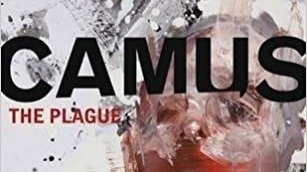
When COVID-19 times started "The Plague" by Albert Camus become once again popular. Yes, I remember I wanted to buy it somewhere at the beginning of 2020 and it went out of circulation, so Folio (Ukrainian publisher who published translation) made a new edition, which I bought in summer and read in December.
The story takes place in Oran (French Algeria) in the 1940s and Camus used as source material the cholera epidemic that killed a large proportion of Oran's population in 1849. Albert Camus himself was born and lived in Algeria and that's why the image of Oran is so vivid and it makes you want to visit that place. Of course, now Oran is very different but I checked the photos and there is a lot of nice French architecture left.
The main hero is Doctor Rieux and his fight against the plague is very devoted. He works 20 hours/day while his wife stays in a sanatorium in another city and they have no communication. Dr. Rieux builds a team of volunteers to help fighting plague: Jean Tarrou - the guest of Oran, Raymond Rambert - journalist who wants to find a way and escape the city but then decides to stay, Joseph Grand - retired clerk who is obsessed with his writing work (and spends months on composing and changing one first sentence of his novel). The latter personage reminds us that Camus was connected to absurdism and even was defined as a "philosopher of the absurd".
Interesting to observe the changes of the people in the novel, their thoughts and arguments, but even more interesting for me was to observe the atmosphere of the city, the lockdown measures, and how everything was different from our coronavirus times.
Some measures were harder, some softer. Plague is not coronavirus, it's much worse. But still, cafes, bars, and restaurants were working. This was even a bit shocking to know they were not shut down, in the contrast to the seaside which was closed. You also might be surprised that the most common way of communication at that period was telegram. Not the known messenger, but real telegram. Phone calls were problematic to do and letters came with huge delay, so the telegram was the connection between the city and the rest of the world.
In conclusion, that's an interesting book, but I can't say I was impressed. Recently in one of his AMAs, Charles Hoskinson named Albert Camus as one of his favorite philosophers (along with Bertrand Russel) and I was surprised to hear that because for me there many other more interesting authors.